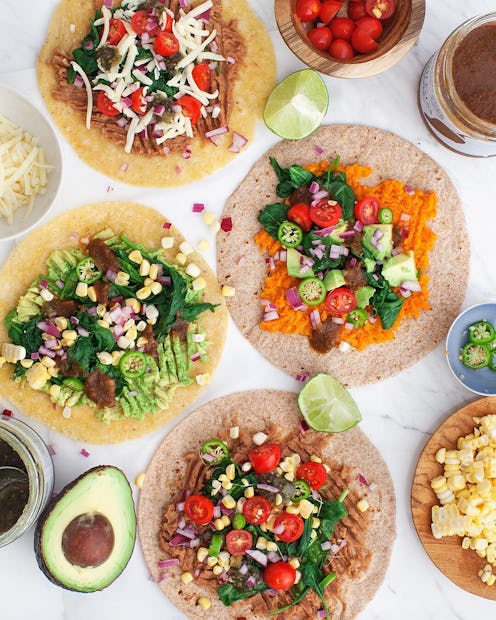Cutting out meat from your diet can be a daunting process—especially if you’re the kind of person who lives for a medium-rare steak. And if you’ve decided to replace your aforementioned steaks with portobello mushrooms, it can be tough to know where to start.
“Literally everyone can benefit from cutting out meat, especially factory-farmed meat, from their diet,” says Elissa Goodman, certified holistic nutritionist behind the cleanses at healthy LA eateries Cafe Gratitude and M Cafe. “Even if it’s not 100% of the time, just cutting down can be incredibly beneficial from all angles when it comes to health.”
She says eliminating or reducing meat consumption can help reset your hormones, because much of it contains growth hormones, antibiotics and other toxins. “Your hormones are kind of like your human software, and the toxins that build up in meat throw them for a loop. Hormones are responsible for everything from mood to weight loss, so resetting them is one of the best things you can do for overall health,” she explains.
Ready to go vegetarian? Here are Elissa’s top five tips for going meat-free.
How To Go Vegetarian
"The best way to fail is to try to change too much too fast," Elissa says. "Start with one day a week where you eliminate meat, or even one meal—breakfast, lunch, or dinner. This will help you build the habits required to approach vegetarianism."
"[People are incorrect in thinking] that it has to be all or nothing. We have this obsession with labels in our culture. You have to be one thing and that's it. But it's perfectly okay to be a vegetarian 80 to 90% of the time. I encourage my clients to own their health. Do what works for you and don't over-concern yourself with strict labels."
"Be sure to add in enough plant-based protein each day. Beans, legumes, organic soy such as tempeh or edamame, quinoa, nuts and seeds are all great sources."
"It's easy to become nutrient-deficient when transitioning to plant-based eating. Vegetarians need to watch B-12, vitamin D, iron, zinc and omega-3 fatty acids. You might need to look into supplementing with these nutrients."
"Eat nutrient-dense whole foods. A vegetarian diet doesn't necessarily equal a healthy diet! You could live off bagels and Twinkies and you'd still be considered vegetarian. Fill your plate with whole, plant-sourced foods. Lots of fresh veggies, whole gluten-free grains, legumes and healthy fats like avocados, olive oil and coconut oil."
"Don't be afraid to eat! As long as you're sticking to plant-based whole foods, eat until you are completely satisfied. This may mean eating more volume than you’re used to with meats included in your diet."
